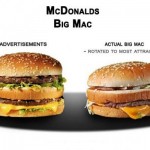Truth In Advertising
 Advertisers and marketers continue to search for that one amazing thing that will improve results. And over the years, the industry has gone back and forth over what actually makes a successful ad. These theories have included:
Advertisers and marketers continue to search for that one amazing thing that will improve results. And over the years, the industry has gone back and forth over what actually makes a successful ad. These theories have included:
- Lots of copy
- Minimal copy
- No copy at all
- Clever images
- Visual puns
- Product demonstrations
- Witty headlines
- No humor at all
- Repeating the phone number
- Hard selling
- Soft selling
- Subliminal images
- Huge budgets
- Small budgets
- Celebrity endorsements
The list could go on and on, but you get the picture. The problem with all of those ideas in the list is that they are basically execution methods. A clever image is all well and good, but what’s it saying? Lots of copy is fine, but how do you get people to read it? And continue reading? Sure, celebrity endorsements work, but what message will they communicate?
There’s only one answer to all of those questions, and it’s something that is at the heart and soul of every successful advertising campaign. The truth.
Tell The Truth And Consumers Will Love You For it.
Bill Bernbach, an advertising legend, was a great proponent of the truth. So much so that he would often make a company improve the quality of their product or service before creating an ad campaign around it. After all, as Bernbach so profoundly said:
“A great ad campaign will make a bad product fail faster. It will get more people to know it’s bad.”
It’s odd to talk about it; it’s not like advertising lies per se. But it does bend the truth, a lot, which is called exaggerating the benefit. But sadly, the exaggeration seems to have gone from the sublime to the ridiculous over the years. And now, the consumer is presented with very slick, beautiful ads that say very little…and what they are saying is not believable. That’s because many ad agencies are confusing “exciting truth” with “exciting ads.” Another classic Bill Bernbach quote gets right to the heart of the matter:
“A dull truth will not be looked at. An exciting lie will. That is what good, sincere people must understand. They must make their truth exciting and new, or their good works will be born dead.”
When DDB advertised the VW Beetle in the 60’s and 70’s, every ad was born from a truth about the product. And it was done with style, wit and grace. Sometimes it was blatantly honest, such as the infamous “Lemon” and “Think Small” ads. But what happened was massive consumer interest and appreciation. They loved being told the truth. It was a refreshing change from the slick car ads that came before. And the VW Beetle became one of the best selling cars in America.
What if the Truth Isn’t Good, or Interesting?
Well, that’s a tough one. If you cannot find one good, honest and sellable truth about your product or service, it may be time to have a long, serious meeting with the client. After all, you are being tasked with deceiving the potential consumer into believing things that just aren’t true. It will come out in the wash eventually, when the consumer tries the said product or service and finds it a very poor comparison to the slick ads that sold it. So, do what Bill did. Talk about ways to improve what you’re selling, and convince the client to run a campaign once the changes have been made.
If you find the truth dull, well, you’re just not looking at it correctly. There’s always something interesting to say if the truth has merit. For instance, the VW Beetle campaign took so many seemingly “dull” truth and created great ads.
Truth: The VW Beetle has several layers of paint
Headline: After We Paint The Car, We Paint The Paint.
Truth: Not all VW Beetles pass inspection
Headline: Lemon
Truth: VW Beetles are small
Headline: It Makes Your House Look Bigger
Truth: VW Beetles are airtight
Headline: To Close The Door, Open The Window
Even when the truth is not something others would brag about, take that as your mantra. If it’s small, don’t apologize or hide from it. Boast about it. If it’s cheap, have some fun with it. If it’s expensive, brag about it.
To sum up, Bill Bernbach has the last word, again:
“The truth isn’t the truth until people believe you, and they can’t believe you if they don’t know what you’re saying, and they can’t know what you’re saying if they don’t listen to you, and they won’t listen to you if you’re not interesting, and you won’t be interesting unless you say things imaginatively, originally, freshly.” (www.advertisingabout.com)



